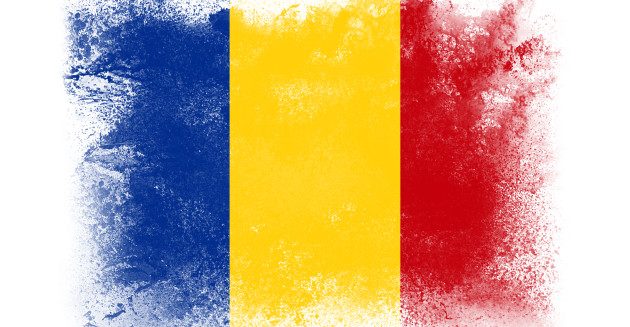Debriefing!
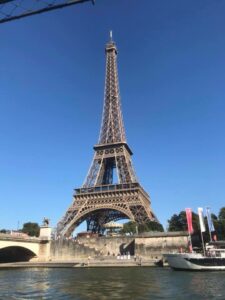 By: Marion Moreland, M.S. in Counseling Student
By: Marion Moreland, M.S. in Counseling Student
Following our departure from Romania, we arrived to Paris for our days of debriefing. On Sunday, we had a free day to explore the city. The Cathedral of Notre Dame is breathtaking and it was incredible to be in a space with such a sense of sacredness. For the rest of the day, we went in different directions. Some went to the Shrine of the Miraculous Medal, others went on tours of museums or the city. A few ventured onto the Seine River for a boat tour. Comments were made about eating our way through Paris, and I do not think that missed the mark. We had a whirlwind tour of the Louvre. With this being peak vacation time for most of Europe, there were huge crowds, but we still managed to hit the highlights of Venus De Milo and the Mona Lisa.
Tuesday morning we loaded up on the bus to the airport. About 12 hours later we were at the airport in Dulles and glad to be home. There are so many aspects of this trip that I would love to be able to share, but I am still in the processing phase. I think the analogy someone used is that it is like standing in front of a fire hose and trying to drink water. I learned so much and I met so many wonderful people, but the true test of the impact will come in the days, months and years to come. I am not the same person I was when I left!
During the two days of training we did prior to the trip, there were two activities that stand out for me. First, we were asked to describe ourselves using an adjective that begins with the same letter of our first name. I chose “matronly” Marion but also commented that I was resisting saying “masochistic” Marion. Both of those words would prove quite fitting. Physically, I pushed myself harder than I can remember doing and there was at least one day where it was only grace and awesome teammates that kept me going. As for the “matronly” part, I had children, team members, and kittens fall asleep in my arms and on me. I was able to be a mom in one form or another to our team, the people we met as well as some of the Smiles staff. The second exercise, I recalled, was we were asked to write down a word that we wanted to feel after our trip. The word I chose was “blessed”. At this moment that word seems insufficient to express the countless ways that I was blessed, but it is nonetheless true.
Day 16 – Friday, August 3rd
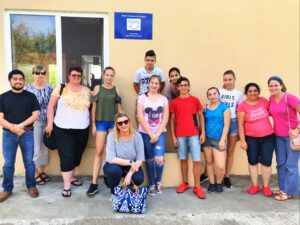 Dr. Arveson’s group went to Gepiu to work with adolescents. We split guys and girls into two groups and discussed avoiding cigarette smoking and dating while doing an activity. In the afternoon, we worked with each adolescent to do modified sand-tray with each young person present. Some of us even played a little ping pong.
Dr. Arveson’s group went to Gepiu to work with adolescents. We split guys and girls into two groups and discussed avoiding cigarette smoking and dating while doing an activity. In the afternoon, we worked with each adolescent to do modified sand-tray with each young person present. Some of us even played a little ping pong.
Dr. Harris’s group went to JFL to work with people who have Downs Syndrome. They talked with patients and parents and even got to see thy hydrotherapy pool in action. They also worked with staff to address some of their concerns including the need for specialists to help.
Dr. Irwin’s group went with Alena, a Smiles staff person, to do assessments to meet with people who are seeking assistance. Dr. Irwin was impressed with how effectively this tiny powerhouse of a woman handles herself in difficult situations. They also did home visits with people who have foster children who are victims of sexual abuse. These parents have two biological children but choose to help children most in need. It was touching to see how the father was embracing his role and being a good father.
Dr. Keyes group went to the homeless container village. Dr. Keyes was amazed at the changes for the better since his last visit 4 years ago. He even met a man who was visiting a friend but had lived there last time Dr. Keyes was there but was now employed and living on his own. Others appreciated working therapeutically with people staying there.
Kevin shared a touching story of how staff from Tileagd encountered a woman who had not been able to leave her bed for 3 weeks and she was living alone except for 5 dogs and countless cats. She was basically laying in excrement. The staff immediately took her to the center, cleaned her up and started her on medication. The photos we saw were taken 8 hours apart and are night and day different. The Smiles Foundation is doing some wonderful work to help the poorest of the poor.
Day 15 – Thursday, August 2nd
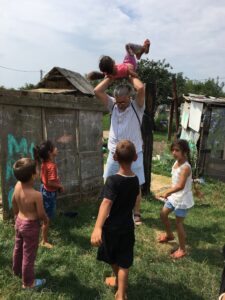
Thursday found one of our groups visiting the Gypsy village in Tileagd. We started out with a morning visit to one of the Smiles Foundation’s educational projects in that same city, a nursery that hosted about 18 Romanian children every morning. Upon arriving at the nursery school, we were greeted by a young Gypsy boy, David, whom our driver and interpreter invited to spend the day with us. He joined in the activities and play at the school. While there, we sang songs, colored with the children, made a craft together, and played with some of their toys together.
Just before lunch, we headed over to the facility Smiles operates nearer to the Gypsy village and ate lunch in one of their air-conditioned rooms with David. He studiously removed the lettuce, tomato, and sweet peppers from one of the sandwiches we had brought. One of our group kicked a ball around with him while the others finished their meal, and we headed over to the village.
The village has been greatly improved over the last several years and boasts permanent houses made mostly of cinder block and brick, covered by locally-made plaster. There are few mud-and-stick homes left in the village. Upon arriving at the home where our driver wanted to see some of the local women, we were greeted by about 18 children, aged from about four to 12 years. Two members of the team went into one of the homes while two of us spent time playing with the children in a small field outside.
The Gypsies know the game “Red Rover”, so some of them played that with one of our team and the other team member instructed the kids on how to properly throw a Frisbee. Most of them initially wanted to launch it as one might a baseball. Our translator and driver remarked that these children rarely have an opportunity to play with an adult male, but they made the most of it. One of the older children had the idea to play “prisoner” with Vincent and they bound his arms to his sides and skillfully tied a rope around his legs, then dragged him along for a bit. He was quite happy to play this game, but the kids were far more excited. After some time, two of the young boys went into their home and called their mothers out to help our team member become free.
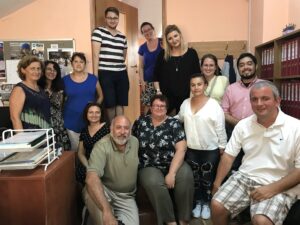 After we tired of the more active sports in the sun, we moved to the side of one of the homes where there was some shade and split into two groups. One of these groups chatted and another listened to the other member recite poetry in English. The children, most of whom were between four and six years of age, were riveted by the tone and meter of the verse. Two of the poems, in particular, elicited enthusiastic responses from the children: Vachel Lindsay’s The Congo created moments of fright when the recitation landed on the word “Boom.” A dramatic recitation of Lewis Carroll’s Jabberwocky also created quite a response from the children.
After we tired of the more active sports in the sun, we moved to the side of one of the homes where there was some shade and split into two groups. One of these groups chatted and another listened to the other member recite poetry in English. The children, most of whom were between four and six years of age, were riveted by the tone and meter of the verse. Two of the poems, in particular, elicited enthusiastic responses from the children: Vachel Lindsay’s The Congo created moments of fright when the recitation landed on the word “Boom.” A dramatic recitation of Lewis Carroll’s Jabberwocky also created quite a response from the children.
Day 12 – Monday, July 30th
By: Marion Moreland, M.S. in Counseling Student and Tess Smith, Psy.D. Student
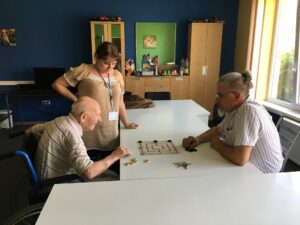 Today we are working in nursing care facilities in two locations, a gypsy camp and a facility that helps people with autism. The location for the people with autism is named SOS Autism, which is a day center for adults 18 and above. There were had opportunities to meet with both staff and parents, sharing stories and a few tears. The two mothers they met with expressed their concern for their children when they are gone.In Maslow’s hierarchy, the needs for food, water, and safety need be met before psychological needs can be addressed. This was clear in the Solard gypsy camp. Smiles has been working with them for about 8 years, but the progress has been slow since many of the people there are just fighting for survival.
Today we are working in nursing care facilities in two locations, a gypsy camp and a facility that helps people with autism. The location for the people with autism is named SOS Autism, which is a day center for adults 18 and above. There were had opportunities to meet with both staff and parents, sharing stories and a few tears. The two mothers they met with expressed their concern for their children when they are gone.In Maslow’s hierarchy, the needs for food, water, and safety need be met before psychological needs can be addressed. This was clear in the Solard gypsy camp. Smiles has been working with them for about 8 years, but the progress has been slow since many of the people there are just fighting for survival.
Arriving at the nursing home in Tileagd, we learned that a patient had just died. Realizing that this is something they deal with regularly we shifted our presentation from strictly compassion fatigue to grief and loss with compassion fatigue interwoven. We then demonstrated 4-7-8 breathing and calm place. Near the end, we were approached by a volunteer staff person who needed some extra help in working through her grief. The political history of Romania continues to come up and how it has affected families. Some will say that the country was better off with Communism because everyone had jobs then. Even though they would have to stand in line for food, having a job gave them the money to buy it. When Communism was overturned, it left a void. Now, many people struggle to find work. We regularly hear how people will travel to Spain, England, Italy, and Germany just to get work. Dr. Arveson’s group ventured out to Rapa Today and made some home visits. Alena, a Smiles social worker helped one woman fill out paperwork to request social services from the local mayor to help her while she is caring for her disabled daughter. After the visits, we did some play therapy with the children. We had them draw a house, a tree, and a person. Some of the drawings were quite interesting. The children wanted to show us their waltz which led to an exchange of dances between us and the students.Dr. Harris’ group did some home visits, including to a family who had lost everything and they were rescued by Smiles. A couple team members did some great work with a woman who was suicidal by giving her coping skills and love. The group creatively used emojis to help the children express their emotions.
Dr. Irwin’s group went to social services and presented on trauma then switched to conflict resolution in the afternoon. They worked with field workers and did a compassion fatigue talks and then taught a modified sand tray. Dr. Irwin also asked questions of Jenn and Rose which led to sharing two different parenting styles and challenges; a large family and a family who has had children with autism.
Dr. Keyes’ group spent the day with Andre and Theodora, the psychologists we had worked with last week. They also toured a pediatric hospital. In the afternoon Dr. Keyes presented on trauma and helped local psychologists to see how the trauma can impact their lives. They also taught a modified sand tray, but there was a little resistance to showing their full family dynamics because of how vulnerable they would be among their peers. This group was excited by what they see as the third wave of counseling including EMDR, DBT, Neurotherapy and virtual reality.
Day 9 – Friday, July 27th
By: Marion Moreland, M.S. in Counseling Student and Tess Smith, Psy.D. Student
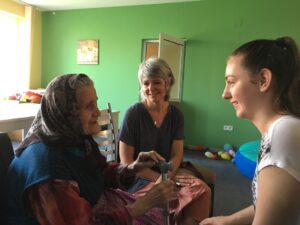 On Friday, Dr. Irwin’s group did home visits near Oradea. They visited the emergency shelter and met with two of the beneficiaries living in the house. The team was able to offer practical skills to one beneficiary to help relieve symptoms of depression. Meeting with people in their homes allowed our team to interact with the natural settings of the Smiles beneficiaries.
On Friday, Dr. Irwin’s group did home visits near Oradea. They visited the emergency shelter and met with two of the beneficiaries living in the house. The team was able to offer practical skills to one beneficiary to help relieve symptoms of depression. Meeting with people in their homes allowed our team to interact with the natural settings of the Smiles beneficiaries.
Dr. Keyes group did fieldwork which included visiting family and to an emergency shelter on domestic violence, families in Oradea. Dr. Harris’s group was at Jeppu which is another gypsy village doing family visits. Dr. Arveson’s went to a container village for homeless people and did some one-on-one counseling. They were surprised to encounter people who spoke English pretty well.
Day 8 – Thursday, July 26th
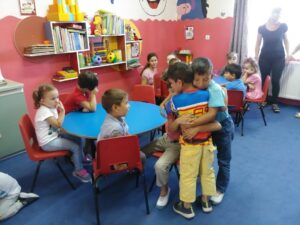 By: Marion Moreland, M.S. in Counseling Student and Tess Smith, Psy.D. Student
By: Marion Moreland, M.S. in Counseling Student and Tess Smith, Psy.D. Student
Thursday morning, one group spent time at the nursery in Tileagd. We interacted with the students in their classrooms and presented a puppet show on similarities and differences. The classes include children from both gypsy and Romanian homes. Adults draw barriers between the two groups but the children interact with ease. In the afternoon we met with the leader of the Gypsy community and his wife. We presented on compassion fatigue and encouraged them both to spend the time to refresh themselves so they are able to continue their work in the community. We visited the gypsy community until yard and interacted with the children.
Another group presented on child and adolescent trauma to psychologist and students at the University of Oradea. During the presentation, they also used modified sand-tray to look at family dynamics. The 3rd group was at Echo, which is a nursing home where they worked with the staff.
Dr. Arveson’s group went to Quesh which is a gypsy village. They made home visits in a cluster of home, distributed some food and then saw some families who resided further away from the village. Some of the homes were quite dilapidated and unclean while others were beautifully maintained. The families with the nicer homes tended to have family members who worked outside of the country.
Recap from Another Team Member
By: Laura O’Neil, M.S. in Counseling Student
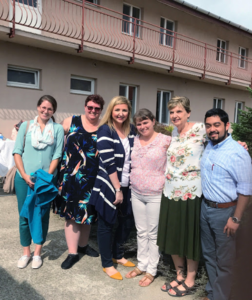 Reporting live from Cihei, Romania! It is the end of the 4th day of fieldwork. We arrived here in Romania Saturday night, and I have already had more experiences than a blog post could ever capture! My thoughts and feelings have been all over the map—pun intended! I continue to process those, so here, I will keep you up to date by simply recapping the first few days of fieldwork in Romania.
Reporting live from Cihei, Romania! It is the end of the 4th day of fieldwork. We arrived here in Romania Saturday night, and I have already had more experiences than a blog post could ever capture! My thoughts and feelings have been all over the map—pun intended! I continue to process those, so here, I will keep you up to date by simply recapping the first few days of fieldwork in Romania.
The first day was a smooth entry into working with the Romanian people. My small team, led by Dr. Kathy Arveson, went to a nursing home facility and spent time having conversations with the residents. I met six wonderful older adults in the morning, and spent about 30 minutes with each of them, hearing their stories and doing reminiscence therapy. They all spoke of the impact communism had on their lives—very powerful. Each student had a fantastic translator assigned to us. Then in the afternoon, we did a training presentation for their staff on Quality of Life and self-care. This training was well received, as the Romanian women working at the facility have an incredible work ethic and rarely take sufficient time to decompress after helping others all day and truly care for themselves. Another team of students with Dr. Keyes went to the community of Tileagd on Monday and conducted counseling sessions with seniors. A team with Dr. Harris went to Rapa, a gypsy village and spent time visiting with families. One student said how acutely aware she was of being American, and another stated that the families he talked to have such real problems and yet were so thankful for the visit. Dr. Erwin’s team went to a place that is called ECO, Elderly Care Oradea and did group counseling with the residents.
The next day was truly so much fun! My team went to the city of Oradea and spent the day with two psychologists, Andrei and Theodora Puscas. (https://www.tap-psiholog.ro) It was an incredible and energizing day. We saw patients with them in their clinic in morning. In Romania, they are beginning to incorporate mental health visits alongside medical appointments. The patients we saw were there for diabetes check-ups and came to see the psychologists at the same time—fascinating that Romania has advanced in this way. Then we visited the main hospital of Oradea, to see patients in the neurological unit. This trip to the hospital caused us to walk through the entire old part of the city, which we loved!!! Then we finished the day by visiting Andrei and Theodora’s private practice, located right next to the famous Moon Church in the city square, and reviewed case studies with them. Amazing.
Day 7 – Wednesday, July 25th
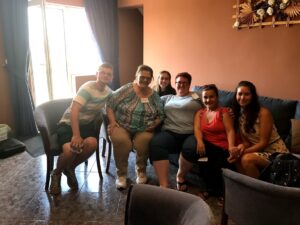 By: Marion Moreland, M.S. in Counseling Student
By: Marion Moreland, M.S. in Counseling Student
Two of our groups spent the day on the Smiles compound today doing training for various Smiles staff. We had 18 people joining us. In the morning Dr. Arveson’s team presented on compassion fatigue. We explained that listening to traumatic stories can take a toll on our ability to be compassionate. We taught Emotional Freedom Technique (EFT), breathing and developing a safe place. EFT is a relaxation technique that uses bilateral stimulation by tapping on trigger points to reduce distress. In the afternoon Dr. Irwin’s group presented on diffusing a crisis and solving a problem. Each presentation was followed by lengthy group sessions with the team members where we had the opportunity to discuss problems that were relevant to each person in light of the presentations. The groups provided opportunities to share, brainstorm and problem solve but perhaps the most important component was building connections. It felt like everyone was where he or she needed to be and with the people, they needed to be with.
In the morning, Dr. Keyes and Dr. Harris’ groups visited a facility that works with patients who have multiple sclerosis, teaching deep breathing, guided visualization and relaxation, and basic EFT. Their afternoon was spent at a state-run mental institution in Bratca that houses mentally disabled adults, legacies of the orphanages of the communist era. The residents there literally stormed the bus upon arrival, climbing aboard and examining every corner. In a touching and intense desire to connect, the residents swarmed the team, grabbing hands, hugging, kissing, and crying out in joy. The unexpected reception led the team to quickly improvise games like Duck, Duck, Goose, Red Rover, Red Red Rover, and Simon Says – all in Romanian of course!
Day 4 – Sunday, July 22th
Buna Dimiyatza!
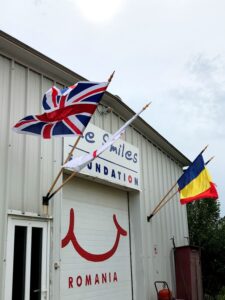 By: Marion Moreland, M.S. in Counseling Student
By: Marion Moreland, M.S. in Counseling Student
This afternoon we gathered with Kevin Hoy, the founder of The Smiles Foundation. It was our opportunity to learn a little more about what our schedule will be like over the coming weeks. In short tonight, after dinner, we will get a short introduction to Romania. While many people speak Romania there are others who speak Hungarian around and, of course, the gypsies of their own language. I am certain we will be grateful for interpreters and all the hard work they will do.
Following our language instruction, it will be time to begin preparing for the days to come. We know that tomorrow, one group will be going to work with children while the other 3 will be at different convalescent hospitals. Of course, I bear in mind as Dr. Keyes said, “The one thing constant in trauma work is change.”
One of the things that struck me was Kevin saying that while we will be helping some of the people we will also be helping to teach the workers so they can carry on long after we are gone. I see it as our brief moment to make a difference not only in the people but in the system. This does not mean that we are experts but rather we have some knowledge that may be helpful when it is applied within the context of the culture of the people with whom we work. They are the experts on their culture and people.
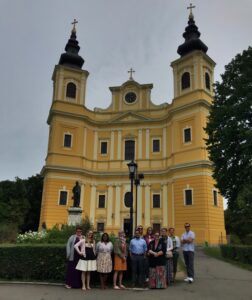
Kevin gave us a history of The Smiles Foundation but for now, I’m going to send you to the Smiles Foundation for a little history of the organization, perhaps later I will be able to give you more. The one thing that struck me was when they began working in Tileagd they were opening a school but the children did not know their birthdates and how to write their names so they used handprints to identify them. He said it unintentionally gave them a clear picture of the uniqueness of each child. Can you imagine comparing the handprints of the children when they began with when they finished school?
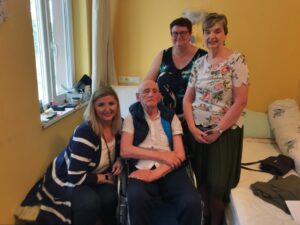
Day 2 – Friday, July 20th
By: Marion Moreland, M.S. in Counseling Student
The team continued to explore Where is God? and to build teams. We broke into our small groups for the first time and got to know each other a bit more by practicing our modified sand tray techniques.
About 4:30 PM Friday, we loaded up on our bus and headed for the airport. First stop was Paris and then onto Hungry. While the flight time was long, everything went pretty smoothly. We arrived in Budapest only missing one suitcase which had been located in Paris and will get to us shortly. As I write this I’m in a van on the highway on our way to Oradea. The local time is about 8 PM on Saturday. We may be tired and ready for a shower, but our hopes are high and the countryside is beautiful.
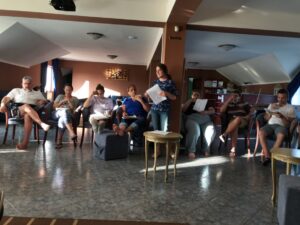
We were welcomed to the Smiles Center about 11:30PM by Luke, Chloe, and Christina who unloaded our luggage and received our room assignments. After briefly getting into our rooms we gathered again for some snacks of pizza with meat, mushrooms, and corn, along with french fries.
Day 1 – Thursday, July 19th
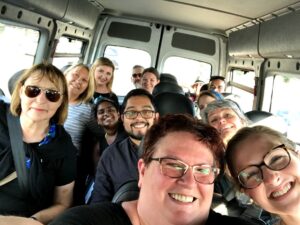 By: Marion Moreland, M.S. in Counseling Student
By: Marion Moreland, M.S. in Counseling Student
The DMU team, which gathered from North Dakota, West Virginia, Texas, Michigan, Virginia, North Carolina, Florida, New Jersey, California, Maryland, and New Hampshire, began to build bonds of a team that will carry us through our journey. Throughout the day, Dr. Kathy Irwin and Dr. Benjamin Keyes lead us in exercises to get to know each other better. I won’t spoil the activities in case you come on future trips, but I will say that there were movies, hula hoops, values and adjectives involved.
During our time we will be working with people across the ages, those that are incarcerated and several gypsy camps. A brief history of Romania revealed the man behind the myth of Count Dracula. Vlad the Impaler ruled in Romania during the latter half of the 1400’s with an iron fist. Crime dropped due to fear of brutal punishments. These tales of cruelty would be the basis of Bram Stoker’s novels about Dracula.
Understanding cultural competence was an important part of our day. We talked about how we are perceived by people of different cultures. Good intentions and a desire to help do not mean that we have all the answers or the right to impose our beliefs on others. A discussion of the book Where is God? by Jon Sobrino led us to see the different values and the cultural beliefs even among our small group. This serves as a reminder that if all of us are coming from one country with all these differing opinions, how much more so varied will the thoughts and perceptions be of the people in Romania.

